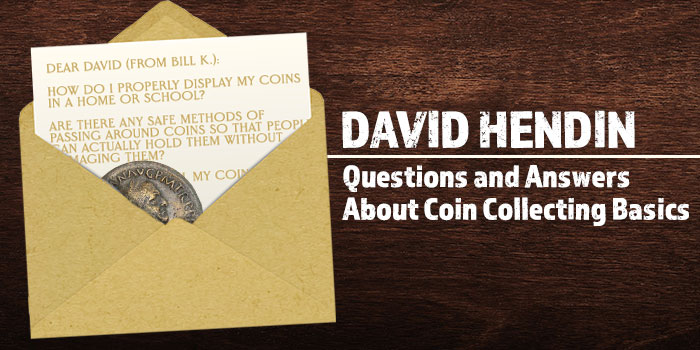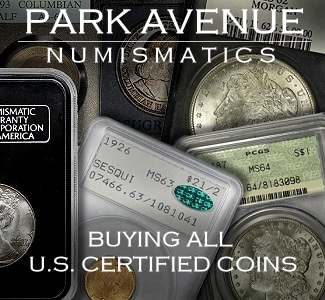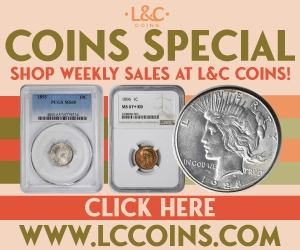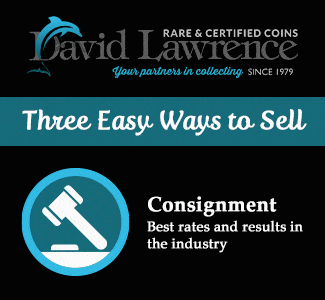
By David Hendin for CoinWeek …..
Dear David (from Bill K.):
- How do I properly display my coins in a home or school?
- Are there any safe methods of passing around coins so that people can actually hold them without damaging them?
- How should I label my coins?
- How do I value or appraise my coins for an investment portfolio or my estate?
- What are some trustworthy places to purchases coins?
Thanks, Bill. You are not the only collector asking these questions.
I have been collecting coins since I was eight years old, and I have tried many different systems. Here are suggestions based on my experience. These are not the only way to do things, but they have worked well for me for more than 65 years!
Display
Coins are not large sculptures or paintings, so they are challenging to display at home, school, or even in museums. They are small and present security problems. During all of my adult collecting years, I have stored my coins in a bank safety deposit box. If you want to display coins at home, I suggest being very selective and only keeping a few coins there as a matter of security. The same is true for schools that do not have a security system.
Some people keep safes at home. Keep in mind that a small, inexpensive safe, is not so “safe” (it can, after all, be carried away), while a large, heavy safe is not so convenient for many homes.
Remember that most of your friends and relatives are not coin collectors and few of them understand your fascination with these little objects which, in the best circumstances, are small and hard to look at. A number of companies make trays or cases with glass or plastic tops that can be closed and locked and used for display.
If you use a desiccant to keep your coins dry, be sure you use the correct kind. The small desiccant packs that come with some foods or other small products are NOT USEFUL to keep with your coins. Their capacity to absorb water is used up almost as soon as the package in which they were contained is opened. Instead, you will need to obtain an indicating silica desiccant product that changes colors, for example from blue to pink, when it needs recharging (by heating in an oven as directed). The effective products are around the size of a box of baking soda.
Here is an idea that has worked out well for me ever since I realized that most people are bored to death when I show them a whole bunch of coins. Except for sharing with other collectors, I make it a habit to select only one or two coins to show around to family and guests on special holidays or events. At Christmas, one can show people coins of Herod I, who was king when Jesus was born, or “widow’s mites”, which play an important role in Jesus’ teachings. At Easter, the coins of Pontius Pilate or the Roman emperor Tiberius are relevant. During Chanukah, I bring coins of the Maccabees, and at Sukkot (Tabernacles), I show off some coins of the Jewish War and the Bar Kokhba War that depict the lulab and etrog, symbols of that holiday. I also traditionally bring an ancient Egyptian scarab or other small ancient Egyptian object to the Passover Seder.
When a coin is relevant to a particular celebration or event, it is of special interest to non-collectors and the coin and stories about it will get more attention.
Passing Around Coins
I agree that you will want to take care when you pass your coins around. Non-collectors will not know how to hold them by the edges, and folks may have damp or dirty hands. I have also seen well-meaning folks accidentally drop coins.
Advanced collectors and museum curators will often use white cotton gloves to handle coins and other precious objects. It’s a great idea, but not practical if you want to pass an ancient coin among a few guests. I have no trouble passing ancient coins, one at a time, among a small group of people. I simply ask them to handle the coins with care. Ancient coins are not as sensitive to being touched as modern coins. Nevertheless, they should be held by the edges when possible.
Some collectors prefer to own slabbed coins. I do not slab my own ancient coins because I like to be able to touch them and put them under my microscope for examination. However, a number of collectors and dealers find slabs convenient. If you do choose to slab your coins, be sure you use only a top-rated firm.
It is also generally safe to pass your coins around in clear envelopes. I recommend non-PVC clear envelopes, but for short periods of time regular clear flips are also okay. Some people use a small piece of clear tape to close the flip so it cannot suffer an accidental opening. In this way, viewers can see the size and heft of a coin and examine both sides and edges.
I recently learned about a product called Magic Floating Frames, which are black plastic frames (a bit bigger than 2 x 2 inches) with two transparent flexible membranes that effectively hold all but the very largest ancient coins in place when snapped closed. I have seen a British version of this product that is a perfect 2 x 2 but was unable to find a brand name. These small frames protect the coins but keep them beautifully and easy to pass around without anxiety that the coins will be touched or dropped. I am not certain about their value for long-term coin storage, but they present no problem for short-term use.
When I give talks about coins in front of small audiences, I find it very effective to project clear enlarged photographs of various coins and then after the lecture pass around (in protective envelopes or small frames) only a few of the coins that were discussed. This gives audience members both the experience of seeing BIG photos of many coins, where they can appreciate the designs and motifs, and handling one or two genuine coins.
Labeling
I’m all for labeling your coins with as many details as possible as long as you remember that the coin is the coin and it is NOT strictly defined by the label applied to it. I have seen many coins with labels that are simply not accurate. And how many catalog numbers do you need to add to your label?
While I was writing these very words, I saw a coin of Trajan labeled by a well-meaning collector as a coin of Hadrian (note: it’s still Trajan). If you (or anyone) writes “EF” on an ancient coin tag, it is no guarantee that the coin really is in Extremely Fine condition, that’s only the opinion of the person who assigned the grade. Collectors know that what is EF to one dealer might be only VF (or even less) to another dealer. Let the buyer beware!
But… the coin is the coin. We humans can only describe them as we see them.
Here is the way I’ve done it for nearly 50 years. I keep my coins in top-quality coin trays that fit in my bank’s safety deposit box. I use Abafils brand trays but there are other good types and brands you can find at your favorite supplier.
Beneath each coin, I keep a heavy acid-free paper or light cardboard circle. On that tag, I write this information: Name of ruler, date of coin, diameter and weight of coin, a standard catalog reference for the coin, date and place of purchase, and my cost (I use a simple code to record cost of my coins as a matter of privacy and security). Obviously one cannot write all of that stuff on a one-inch paper circle without nice, neat writing and an excellent fine-pointed pen! Some people like to put only a number on a coin tag, and associate that number with a written record that is kept in a database or another location. I keep an active spreadsheet database for my coin collection; it generally duplicates information from the tag. It is possible to line a digital image to each entry.
One collector I talked to while writing this article mentioned that storing his collection in trays was taking up too much space, so he moved them into inert flips stored in boxes–“Each of my coins is in a chemically inert flip with a detailed label that includes description, references, dealer, date of purchase, and purchase price. I also place a desiccant in the safe deposit box or safe to reduce moisture.” This collector also tracks each of his coins with a digital photograph and a spreadsheet with all of the information, not to mention an old-fashioned file containing the purchase receipt for the coin.
Value for Estate
As mentioned above, it is important for collectors to add cost information to their coin identification data. The value of a coin is governed by the market at any given time and that value fluctuates with the market. For your portfolio (but not for an estate or most insurance purposes), collectors can appraise their coins by checking on one of the excellent coin reference databases such as CoinArchives or acsearch, both of which charge fees. There are plenty of free references available, even if they are not as complete as the paid sites. Vcoins, CNG, and Heritage are among the companies that maintain excellent and searchable databases with current or past price records. You can also check inventory online at large dealers.
For estate appraisal purposes one should always seek advice from an accountant or lawyer. If an appraisal is needed, a reliable coin dealer or auction firm has the knowledge and will work with your accountant or lawyer to provide the proper detail needed.
Collectors should keep in mind that they will generally pay a 30% premium to buy or sell coins at auction. This translates to a 10% seller’s commission and a 20% buyer’s fee, both of which may be negotiable depending on the size of a collection being sold or the number of coins being purchased. Big picture translation, however, if you have a coin that is valued at $1,000 retail, then you can expect to realize approximately $700 when it is sold at public auction.
Trustworthy Dealers
So many people sell ancient coins these days. There are dozens of reliable dealers in the U.S. and around the world. Many advanced collectors also sell coins. Coins are sold through large public auctions, online auctions, at coin shows, in retail shops, online stores, and at places like Facebook and eBay.
Both genuine and fake coins can be located at ALL of the venues mentioned above. The difference is that, when reliable dealers or collectors learn that they own a fake, they immediately remove it from sale. If a forgery has been inadvertently sold, the refund should be prompt and polite.
Every collector needs a “go-to” dealer or advanced collector as a friend. You can find yours at coin shows or coin clubs. You don’t need me to list the “reliable” ones. Ask around at your local coin club, check out the companies and the people online. If you are still insecure with the knowledge of your “go-to” friends and you feel you need to send your coins off for “authentication”, then it’s possible you need to reconsider your circle of expert friends and dealers. Coins are not genuine because someone says they are, but because they are what they are.
It is also a good idea to consider using your “go-to” dealer as your auction representative. She or he has a lot more experience than you do bidding in auctions and they will also examine the coin carefully and advise you about the coin or coins you are considering.
There is a whole separate question about cleaning and conserving coins, both modern and ancient. This is a completely different and extremely complicated question that I’ll save for another day. But suffice it to say that more than 95% of ancient coins have been cleaned or conserved in some way and the critical issue is if it was done according to professional standards. For now, I will say that every collector’s best protection against being cheated regarding value, authenticity, and state of preservation are: a) your own hard-earned knowledge based on hands-on study, b) the knowledge of an experienced and excellent dealer or friend, or c) a third party authentication or grading service (collectors should be sure they understand any guarantees associated with these services).
© 2021 by David Hendin
Parts of some CoinWeek articles may be adapted from my previous articles or my Guide to Biblical Coins.
* * *
David Hendin is First Vice President and an Adjunct Curator at the American Numismatic Society (ANS). Send him your questions at [email protected] and he will try to answer questions of general interest in this space in the future.





David great ideas and advice.
My only question/slight concern is that bank safety deposit boxes have limited liability. If there is a fire or flood and your coins are lost, there is no coverage for this. I learned this during a Zoom coin club meeting with a representative from one of the top coin auction houses in the US. I have also learned from a good AARP article on appropriate insurance to acquire, that even the standard apartment or homeowner insurace may not cover the replacement cost of a coin collection.
Possibly, we could have someone whose expertise is focused on insuring collectibles to offer advice. For some collectors the only option is to store their coins at home, partly because it is of quite modest value or the nearest secure place for a security box is far away. For others who store their coins in a bank security box, it would be good to know what additional services should be bought to get the best security.
It’s a “safe deposit box” not a “safety…”
I didn’t discuss but certainly recommend insurance for coin collections. The premium is lower if you store in safe deposit box than at home unless you have a “rated” safe. There are good insurance firms that insure collectors for reasonable premiums. Ask your favorite dealer to find you some names.
Is it true that the rare euro coins are becoming collectors items.ive been collecting coins for 30 years now or a little more.i would be grateful for a reply thank you
David, an absolute delight to discover you talking about your coin collecting and how fascinating I find it. More than the coins! It is who you are. Fascinating and you are such a warm and interesting person to be around. Special! Fascinating. And you do well on the tennis courts! ☺️
Michael you need to check with experts on coin values. Modern coins are way out of my field. However it is very simple to google the exact coin and date. Once you see the photographs you can judge the condition of your coin against those coins offered and get a general idea of what your coin might be worth. Many of the dealers who advertise in Coin Week maintain their own websites where you can also check prices and values.
Good luck.
I have 1979 pennie..with a mintmark error…it has a dot under the date